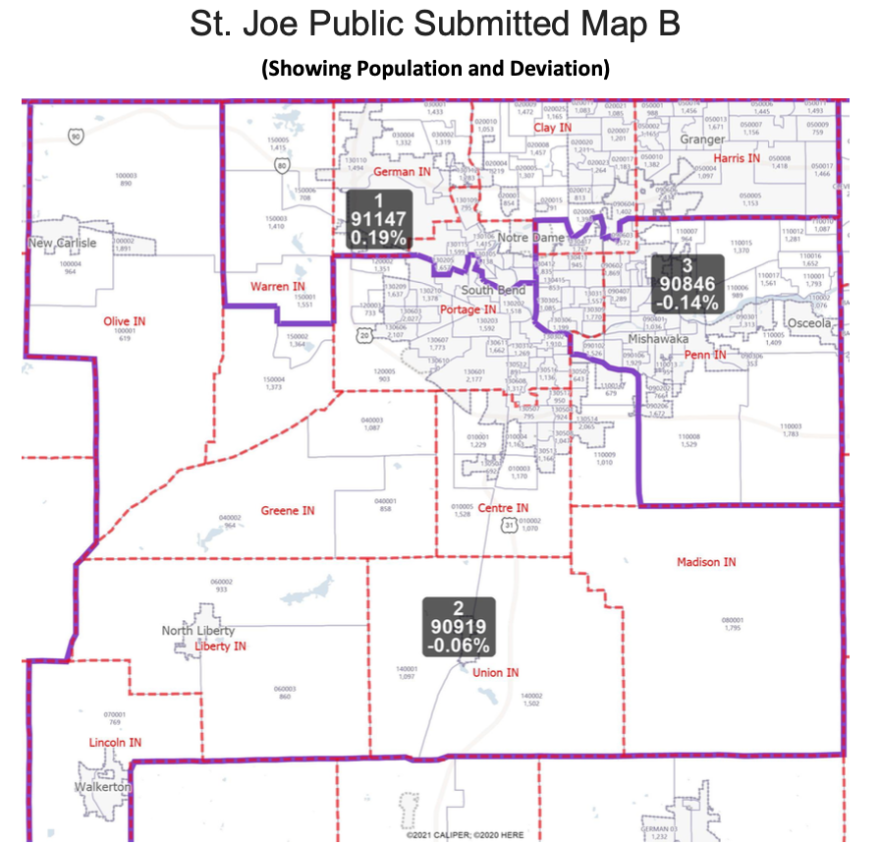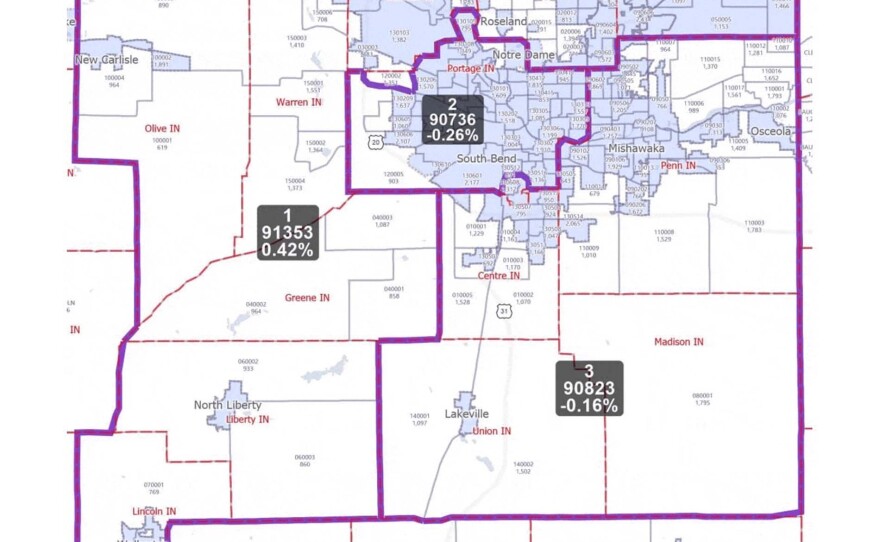The St. Joseph County Commissioners voted 2 to 1 Tuesday morning to enact a controversial redistricting plan that makes two of their districts more Republican and the third overwhelmingly Democratic.
But the new maps may soon end up in court.
The plan creates a heavily minority and Democratic South Bend-based District 2. The new District 1 includes all of Granger and the rural western portions of the county and the new District 3 includes all of Mishawaka, the southernmost portion of South Bend and the rural areas directly south.

During last Tuesday’s public hearing on the maps, two alternative proposals were presented.
One was from New Carlisle resident Dan Caruso. It kept the old districts largely the same and made small adjustments in line with population changes.

The second was from Rajan Rohatgi, a mathematics and computer science professor at St. Mary’s College. It was designed to promote highly competitive elections in all three districts.

Before voting on the final maps, the Commissioners voted 2 to 1 on a separate resolution rejecting both proposals because they don’t conform to the agreed-upon guidelines of not splitting townships.
Commissioner Derek Dieter voted against that. He’s consistently opposed the new maps because he believes there hasn’t been enough public input and that the commissioners should work with the County Council on redistricting.
“I think we failed the voters of St. Joe County on this,” Dieter said. “This sets a bad precedent of what we should be doing as the elected officials listening to both parties, or all three parties, or whoever wants to put their opinion — and I don’t think that has been done at all.”
Dieter said the Commissioners were “rushing” the process and offered a motion to table the resolution on the submitted maps for one week to allow for more public discussion.
But it died after Commissioners Andy Kostielney and Deb Fleming failed to second it.
Kostielney and Fleming then voted to pass the maps — Kostielney said they keep communities of interest together and give South Bend a voice, as the city is now mostly in District 2.
“We removed the political process from these maps,” he said.
Two months ago, the commissioners voted to hire a law firm run by former Indiana house speaker Brian Bosma to help draw the maps at a cost of $35,000. The results were unveiled several weeks ago by Kostielney.
Due to a change in Indiana law this year that only applies to St. Joseph County, the commissioners no longer need the council’s approval to draw electoral maps.
The new maps could also potentially break the County Council’s current 6 to 3, veto-proof Democratic majority.
The change in state law also mandates County Council districts must be within County Commissioner districts.
And under the new maps, only two of the current County Council members would live in District 2, leaving an open seat, and four would have to compete for the three seats in District 3.
During public comment on Tuesday, county resident Amanda Konrath said she’s “disgusted” with Kostielney and Fleming.
“It is unfair to the residents of this county to push this through as quickly as it has been pushed through,” Konrath said.
She also criticized the two commissioners for not attending a Monday night meeting on the maps.
“You should have been there last night to listen, in person,” Konrath said. “Meeting with the public.”
About a third of those present at the Nov. 15 meeting were in favor of the proposed maps, including Granger resident Amy Drake.
“These new maps are a major improvement,” Drake said during the Nov. 15 meeting. “With these new maps, South Bend will be united and have a bigger voice.”
But the other two-thirds of those present at the meeting criticized the maps. Multiple speakers called the proposal a gerrymander that dilutes the power of the county’s Black voters by packing them into District 2.
“Come on — if it walks like a duck and it talks like a duck, then it’s a duck. That’s just the reality,” Mario Sims said during the Nov. 15 meeting. “This is not the way we want to be known nationally, because it will draw a lawsuit. I can guarantee it.”
And County Auditor Mike Hamann said that when he was a County Commissioner in 2001, the redistricting process was “public, open and transparent.”
“Same thing in 2011 — I was on the County Council then, and we worked together with the commissioners and the public was invited to participate,” Hamann said during the Nov. 15 meeting. “It was all out in the open.”
But Hamann said that wasn’t the case this time.
“Wow! Look what happened here — isn’t that funny?” he said. “We have this one district that’s all in the City of South Bend, isn’t that amazing? And by the way, it creates two safe Republican districts.”
“And not only that, there’s more — we also have potentially blown up the majority council districts,” he added. “You cannot tell me — I know all these folks — that that firm wasn’t told to do exactly that. Give us two safe commissioner districts and blow up that County Council district.”
In addition, population changes in the 2020 census raise questions on the legality of drawing any maps.
Under current Indiana law, counties with a population between 250,000 and 270,000 have commissioners elected from three districts.
Effectively, that only meant St. Joseph County. But according to the 2020 U.S. Census, the county’s population is now 272,912.
And that means the three commissioners should instead run in county-wide, at-large elections, which would likely be more advantageous to Democrats.
The County Council would also change, dropping from nine to seven members — four elected from districts, and three elected at-large.
But a bill passed during last month’s special legislative session temporarily froze population values at 2010 levels for determining the redistricting process.
In effect, that means the commissioners used 2020 census data to draw the maps, but 2010 census data to determine the process for doing so — a bit of a paradox.
After the Nov. 15 meeting, County Council President Rafael Morton said the council reached out to the commissioners multiple times over redistricting, but only Dieter responded.
“If they solidify that vote tomorrow, then our only course of coming back and trying to change that decision would be very costly litigation,” Morton said on Monday. “And that’s one of the other reasons we’ve been asking for collaboration with commissioners and public input, and that has not happened.”
He also said that the population change could be a factor in a lawsuit if the map passes.
“These are all unknowns — we cannot predict the future — but that’s an interesting fact,” Morton said.
Council President Pro Tempore Diana Hess said Monday night she thought the commissioners would give Republicans an advantage through the redistricting process, but it was “more drastic” than she expected.
Hess, who is also the president of the St. Joseph County Democrats, said Monday night that the council will be meeting with their attorneys after the vote and that it’s “quite possible” they will bring a lawsuit.
Three weeks ago, the council voted to hire law firm Ice Miller as consul on redistricting at a cost of $36,000.
And even though Dieter will now have to run in the newly heavily Democratic District 2, he told WVPE on Monday that his opposition to the maps is not politically motivated.
“This isn’t a fair way to do redistricting for the entire county,” Dieter said. “However this stuff works out, I’m still running. It was stacked against me when I won last time, it’ll be stacked against me again.”
This story has been updated.
Contact Jakob at jlazzaro@wvpe.org or follow him on Twitter at @JakobLazzaro.
If you appreciate this kind of journalism on your local NPR station, please support it by donating here.




